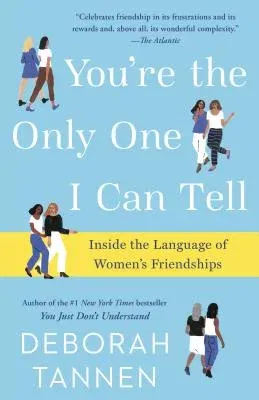This warm, wise exploration of female friendship from the #1 New
York Times bestselling author of You Just Don't Understand will help
women lean into these powerful relationships.
A WASHINGTON POST NOTABLE BOOK - "Celebrates friendship in its
frustrations and its rewards and, above all, its wonderful
complexity."--The Atlantic
Best friend, old friend, good friend, bff, college roommate, neighbor,
workplace confidante: Women's friendships are a lifeline in times of
trouble and a support system for daily life. A friend can be like a
sister, daughter, mother, mentor, therapist, or confessor--or she can be
all of these at once. She's seen you at your worst and celebrates you at
your best. Figuring out what it means to be friends is, in the end, no
less than figuring out how we connect to other people.
In this illuminating and validating new book, #1 New York Times
bestselling author Deborah Tannen deconstructs the ways women friends
talk and how those ways can bring friends closer or pull them apart.
From casual chatting to intimate confiding, from talking about problems
to telling what you had for dinner, Tannen uncovers the patterns of
communication and miscommunication that affect friendships at
different points in our lives. She shows how even the best of
friends--with the best intentions--can say the wrong thing, and how
words can repair the damage done by words. Through Tannen's signature
insight, humor, and ability to present pitch-perfect real-life dialogue,
readers will see themselves and their friendships on every page. The
book explains
- the power of women friends who show empathy, give advice--or just
listen
- how women use talk to connect to friends--and to subtly compete
- how "Fear of Being Left Out" and "Fear of Getting Kicked Out" can
haunt women's friendships
- how social media is reshaping communication and relationships
Drawing on interviews with eighty women of diverse backgrounds, ranging
in age from nine to ninety-seven, You're the Only One I Can Tell gets
to the heart of women's friendships--how they work or fail, how they
help or hurt, and how we can make them better.
"At a time when the messages we give and get have so many more ways to
be misconstrued and potentially damaging, a book that takes apart our
language becomes almost vital to our survival as friends."--The
Washington Post

